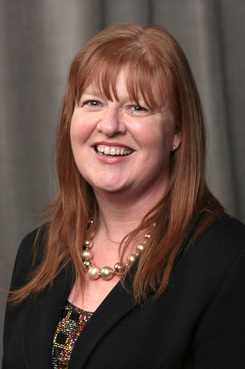Ventura Food's Assistant GC Shares Her 'Small but Mighty' Department's Pro Bono Story
Many large corporate legal departments don't even have a pro bono program. Ventura Foods' three-person legal department has built a robust one.
May 10, 2018 at 01:35 PM
5 minute read
 Monica Johnson, Ventura Foods assistant general counsel. Photo credit: Alex Berliner.
Monica Johnson, Ventura Foods assistant general counsel. Photo credit: Alex Berliner. Many lawyers head to law school with the hopes of helping improve the world—or at least their local communities.
Monica Johnson, the assistant general counsel for Ventura Foods, is making that dream a reality, despite the fact that her legal department only has three employees. She's always been interested in giving back, and she saw the opportunity at Ventura to start a pro bono program that would do just that.
Three years in, Ventura's three-person, “small but mighty” team has provided legal help for local students, veterans and entrepreneurs. Corporate Counsel spoke with Johnson about how the program began and the challenges of pro bono in a smaller department. This interview has been edited for clarity and length.
Corporate Counsel: Can you tell me about your pro bono program?
Monica Johnson: We started it about three years ago. And I should share that we are a mighty and lean legal department of three attorneys.
We were looking for the opportunity to give back, and I identified one and presented it to our GC [Rebecca Smith Walsh]. She was fully on board, 100 percent. We started doing pro bono through Street Law, a program where we go into the high schools into the classroom and teach a legal subject. We taught copyright law the first year. We did that by talking about infringement.
It's really a neat process, because it allows you to directly interact with students using something they would understand. With copyright infringement, we talked about popular music songs [involved in cases]. And having that opportunity to relate to those students with music they understand and relate to helps drive home the concept you're trying to teach.
It also provides a lovely opportunity to share what you do in your day to day legal professional life. So, aside from giving back and teaching, you're also opening the door for the students to see what a legal career looks like. I share with the students that I was the first lawyer in my family.
CC: Was it challenging to start a pro bono program in such a small legal department?
MJ: We're small and mighty. One of the ways we leveraged expertise was we reached out to the ACC Southern California and we partnered with them. Through that, we were able to participate in a veterans' discharge program. They provided the training. We went to the training, met with the veterans and helped those who were [unfairly] given less than honorable discharges.
One of the other ways we mitigate the effect of [being small and doing pro bono] was through the ACC and a small business law program we did. So we went and we taught the basics of business law to people with emerging businesses who didn't have the first idea of, “Where do I need to go? What are the legal aspects of setting up a business?”
CC: Why were you interested in starting this program?
MJ: It's always been something that's been on my personal radar. I've always had a track record of giving back, and I always understood the value of paying it forward.
I served on the California State Board of Optometry, appointed by Gov. [Arnold] Schwarzenegger. That was the first opportunity I ever had to leverage my legal skills as well as my communication skills to make a difference. We made a difference, as we actually drafted and had legislation passed that grew the scope for optometrics to diagnose glaucoma. That helped optometrists in more rural settings to identify glaucoma earlier. So having that expand the legislation got my thinking cap on. I thought, I do this whole law thing every day, how can I pay it forward and how can I give back?
Previous to Ventura, I was in a large legal department, and that wasn't the optimal place to launch a program because of the sheer fast nature of the business. Here at Ventura, I saw the opportunity and brought it to the attention of my general counsel.
Now at Ventura Foods, we've also launched a corporate social responsibility initiative, about two years ago. When our CSR strategy was launched, it was a natural fit for us to talk about our pro bono work, and how we can do [CSR] in a legal setting as well. We share our legal pro bono work with the CSR committee, and it really showed how we are in sync with where our company is going.
CC: How do you decide what pro bono work your department takes on?
I think it's a matter of focusing and looking in our community—our local community, where we do business, where our company does business and what that community's needs are.
This content has been archived. It is available through our partners, LexisNexis® and Bloomberg Law.
To view this content, please continue to their sites.
Not a Lexis Subscriber?
Subscribe Now
Not a Bloomberg Law Subscriber?
Subscribe Now
NOT FOR REPRINT
© 2025 ALM Global, LLC, All Rights Reserved. Request academic re-use from www.copyright.com. All other uses, submit a request to [email protected]. For more information visit Asset & Logo Licensing.
You Might Like
View All
Apple Disputes 'Efforts to Manufacture' Imaging Sensor Claims Against iPhone 15 Technology

Recent CEO Shooting Tragedy a Reminder for Corporate Risk Assessment and Incident Response Plans
7 minute read
Baker Botts' Biopharma Client Sues Former In-House Attorney, Others Alleging Extortion Scheme

Judge Sides With McDonald's In Attorney-Client Privilege Dispute With Former Executives
4 minute readTrending Stories
- 1'A Death Sentence for TikTok'?: Litigators and Experts Weigh Impact of Potential Ban on Creators and Data Privacy
- 2Bribery Case Against Former Lt. Gov. Brian Benjamin Is Dropped
- 3‘Extremely Disturbing’: AI Firms Face Class Action by ‘Taskers’ Exposed to Traumatic Content
- 4State Appeals Court Revives BraunHagey Lawsuit Alleging $4.2M Unlawful Wire to China
- 5Invoking Trump, AG Bonta Reminds Lawyers of Duties to Noncitizens in Plea Dealing
Who Got The Work
J. Brugh Lower of Gibbons has entered an appearance for industrial equipment supplier Devco Corporation in a pending trademark infringement lawsuit. The suit, accusing the defendant of selling knock-off Graco products, was filed Dec. 18 in New Jersey District Court by Rivkin Radler on behalf of Graco Inc. and Graco Minnesota. The case, assigned to U.S. District Judge Zahid N. Quraishi, is 3:24-cv-11294, Graco Inc. et al v. Devco Corporation.
Who Got The Work
Rebecca Maller-Stein and Kent A. Yalowitz of Arnold & Porter Kaye Scholer have entered their appearances for Hanaco Venture Capital and its executives, Lior Prosor and David Frankel, in a pending securities lawsuit. The action, filed on Dec. 24 in New York Southern District Court by Zell, Aron & Co. on behalf of Goldeneye Advisors, accuses the defendants of negligently and fraudulently managing the plaintiff's $1 million investment. The case, assigned to U.S. District Judge Vernon S. Broderick, is 1:24-cv-09918, Goldeneye Advisors, LLC v. Hanaco Venture Capital, Ltd. et al.
Who Got The Work
Attorneys from A&O Shearman has stepped in as defense counsel for Toronto-Dominion Bank and other defendants in a pending securities class action. The suit, filed Dec. 11 in New York Southern District Court by Bleichmar Fonti & Auld, accuses the defendants of concealing the bank's 'pervasive' deficiencies in regards to its compliance with the Bank Secrecy Act and the quality of its anti-money laundering controls. The case, assigned to U.S. District Judge Arun Subramanian, is 1:24-cv-09445, Gonzalez v. The Toronto-Dominion Bank et al.
Who Got The Work
Crown Castle International, a Pennsylvania company providing shared communications infrastructure, has turned to Luke D. Wolf of Gordon Rees Scully Mansukhani to fend off a pending breach-of-contract lawsuit. The court action, filed Nov. 25 in Michigan Eastern District Court by Hooper Hathaway PC on behalf of The Town Residences LLC, accuses Crown Castle of failing to transfer approximately $30,000 in utility payments from T-Mobile in breach of a roof-top lease and assignment agreement. The case, assigned to U.S. District Judge Susan K. Declercq, is 2:24-cv-13131, The Town Residences LLC v. T-Mobile US, Inc. et al.
Who Got The Work
Wilfred P. Coronato and Daniel M. Schwartz of McCarter & English have stepped in as defense counsel to Electrolux Home Products Inc. in a pending product liability lawsuit. The court action, filed Nov. 26 in New York Eastern District Court by Poulos Lopiccolo PC and Nagel Rice LLP on behalf of David Stern, alleges that the defendant's refrigerators’ drawers and shelving repeatedly break and fall apart within months after purchase. The case, assigned to U.S. District Judge Joan M. Azrack, is 2:24-cv-08204, Stern v. Electrolux Home Products, Inc.
Featured Firms
Law Offices of Gary Martin Hays & Associates, P.C.
(470) 294-1674
Law Offices of Mark E. Salomone
(857) 444-6468
Smith & Hassler
(713) 739-1250






